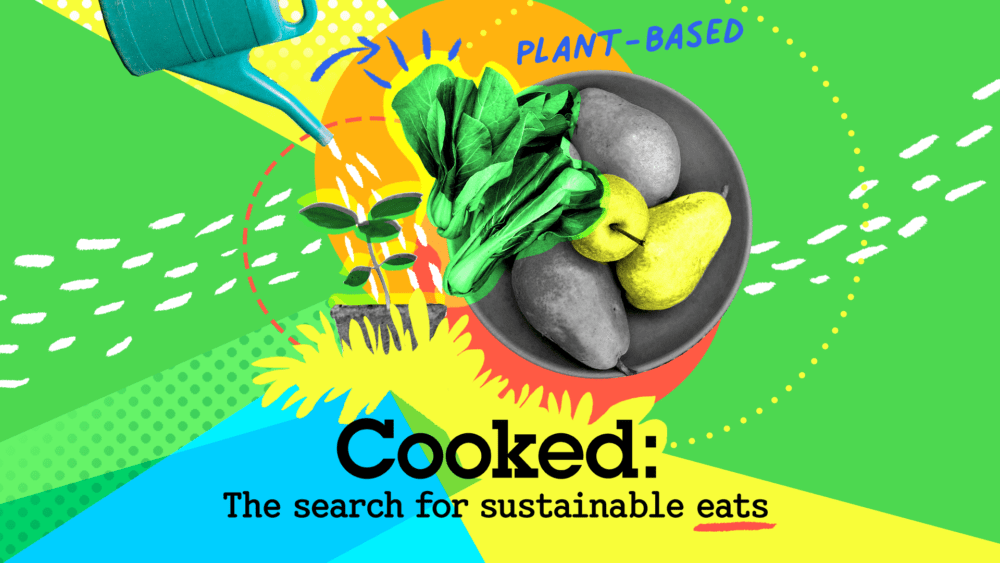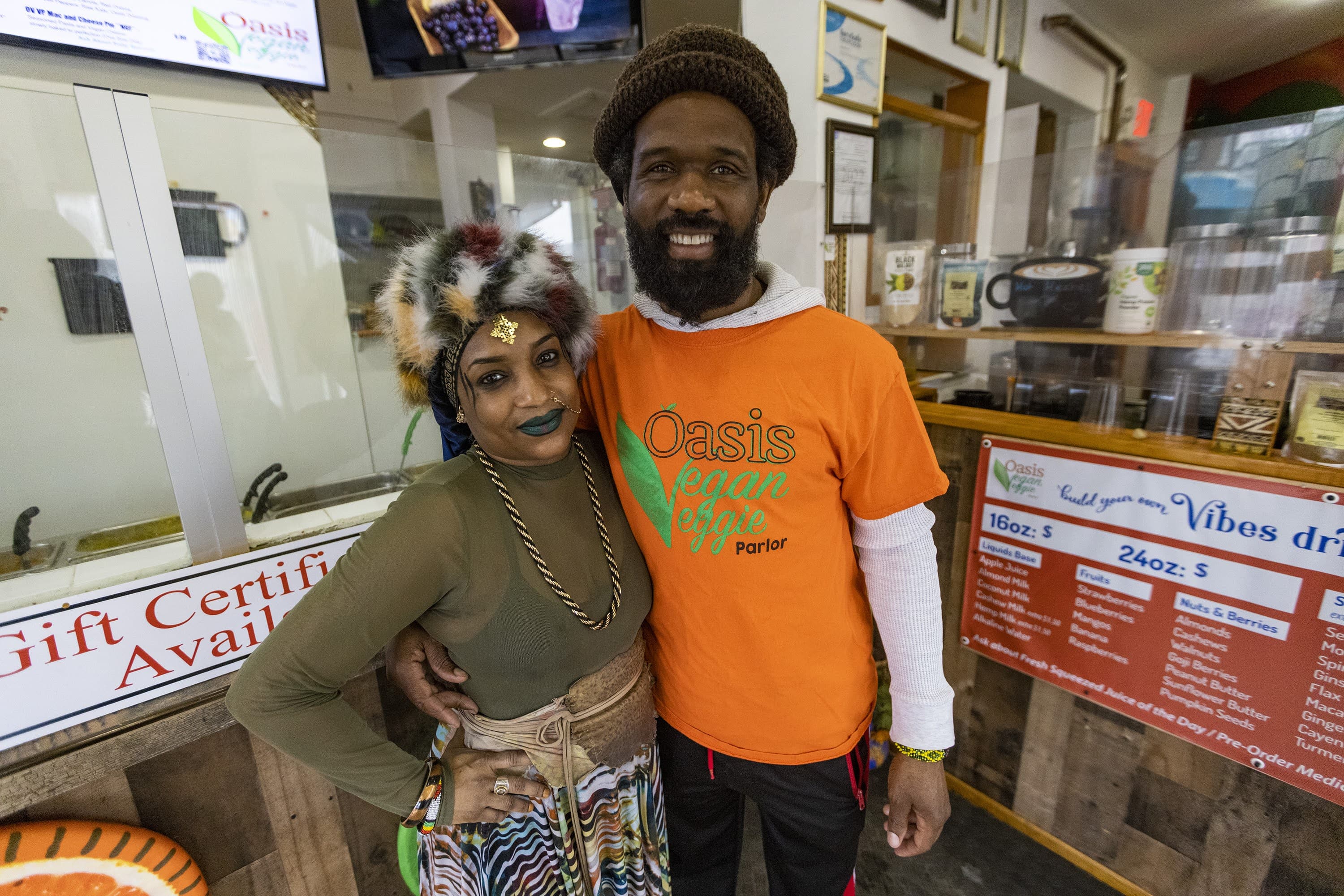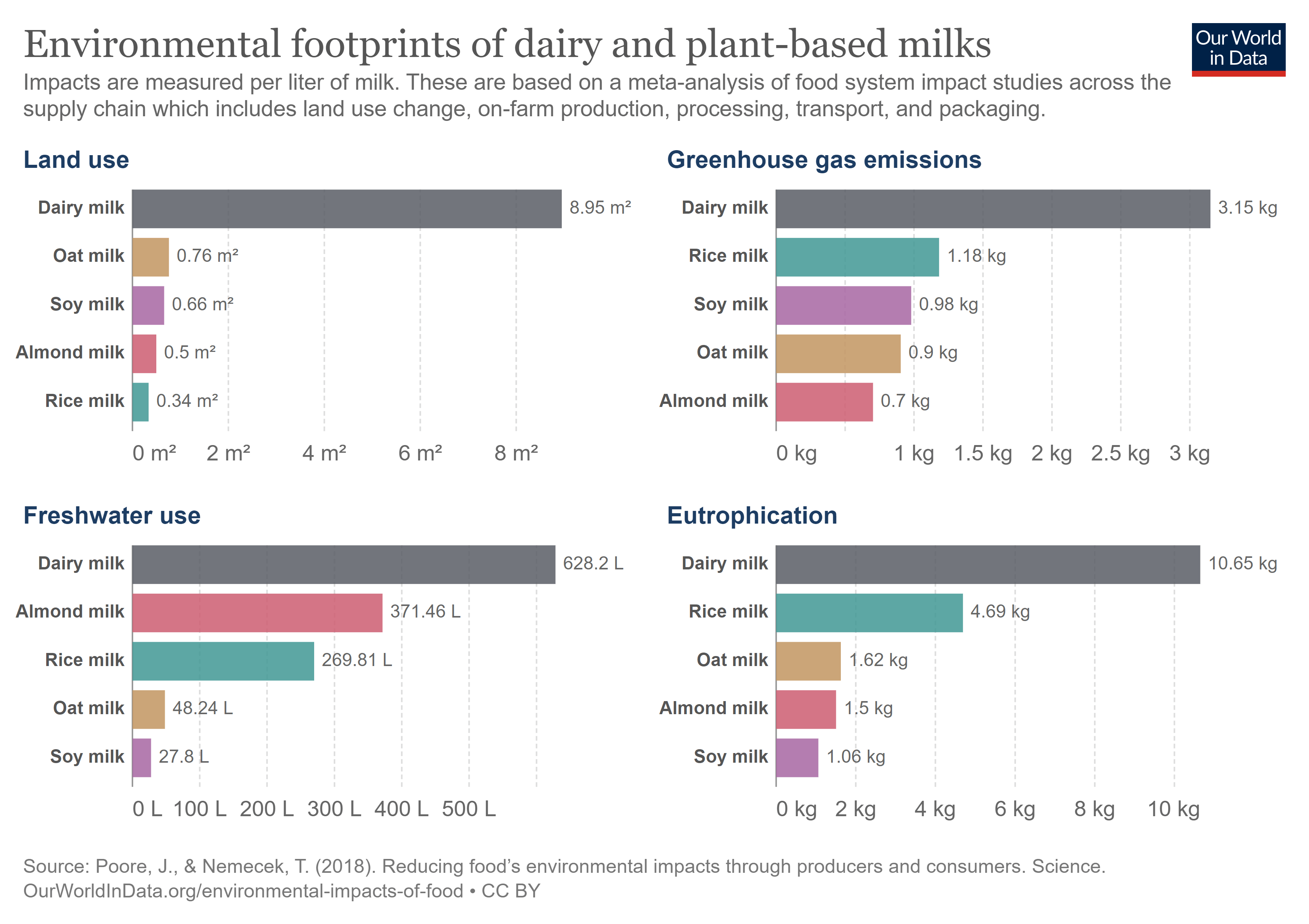Advertisement
Cooked: Do I have to go vegan to be a sustainable eater?

This is an excerpt from WBUR's Cooked newsletter. Sign up to understand how to reduce your impact on climate change and take actionable steps so YOU can make a difference.
Let’s face it: Vegans have an image problem.
Many people seem to think vegans are not only sad, hungry and malnourished, but also smug and self-righteous. “How do you know if someone’s a vegan?” joked one presenter at a food trade show. “Don’t worry, they’ll tell you.”
“Grass-eaters!” said Nahdra Ra Kiros with a laugh. “People think we eat a plate of grass when they’re not familiar.” Ra Kiros owns Oasis Vegan Veggie Parlor in Dorchester with her partner, Jahriffe Mackenzie. They seem neither sad, hungry nor smug. And their restaurant serves awesome smoothies.

Ra Kiros says she often sees a plant-eater dragging a reluctant friend into the restaurant, only to have them won over by the vegan mac-and-cheese pie. “They’ll order five pieces of pie at the same time!”
Ra Kiros and Mackenzie began eating vegan for health reasons, as part of a holistic lifestyle change. Other people stop eating animal products for religious or political reasons, or out of concern for animals. But, increasingly, climate-conscious people are more willing to cut back on meat and dairy to help the planet.
“There has been a growing awareness of the impact of our food choices on the climate and the climate crisis,” said Evelyn Kimber, president of the Boston Vegetarian Society. “People are looking for something that they can do to slow down the crisis.”
She’s seen an “explosion of interest in all things vegan” over the past few years.
"People are looking for something that they can do to slow down the crisis."
Evelyn Kimber, Boston Vegetarian Society president
But maybe you don’t know how to cook vegan food or you’ve got an eensy-teensy bit of that anti-vegan vibe stuck in your heart, like a stubborn piece of spinach in your teeth.
“I think ignorance breeds fear,” said Mackenzie. “When you don't have knowledge of something, you automatically perceive it to be something that can be negative. So, when you gain more knowledge, you say, ‘Oh wow.’ ”
So, let’s stop throwing shade on herbivores and gain some knowledge!
Deep Dive: Is Vegan Better For The Planet?
Fruits, grains and vegetables have a lower carbon footprint than farmed animal products because you need to grow crops to feed the animals. Animals also poop, and pools of poop generate more emissions. So, it's no surprise that a potato has lower emissions than a pork chop.
But then I started to wonder: what about vegan egg replacements? And plant-based meat? And almond milk? Do all those super-processed alt-foods really have lower carbon footprints than actual eggs, meat and milk? And what if that milk and dairy are from a super-cute local farm? That’s gotta count for something, right?
I found a sorta-answer on fake meat versus real meat in a 2020 study from Johns Hopkins. The scientists reviewed the existing research and found that the average carbon footprint of plant-based chicken was 43% smaller than its actual-meat counterpart. Fake pork’s footprint was 63% smaller; fake beef’s was 87% to 93% smaller.
The Johns Hopkins folks were not funded by the alt-meat industry, by the way. But they included this very important, red-flag-waving disclaimer: “much of the existing environmental research on plant-based substitutes and cell-based meats has been funded or commissioned by companies developing these products, or by other non-profit organizations promoting these products.”
So, take your vegan meats' statuses with a grain of salt. But they win this round.
Still, I wanted info on alt-eggs and cheese, too. It turns out those stats are hard to find! So, we hired a team of brainiac graduate students from the Friedman School of Nutrition Science and Policy at Tufts University to help.
You can read about our research process and takeaways here, but you should know that we only looked at the environmental impact of food — not cost, taste, workers’ rights, animal welfare, nutritional value or any of those other important things.
Here are the key comparisons:
1. Chicken eggs vs. plant-based egg replacement
Our research pals at Tufts found that Just Egg, which is made from mung beans, has a lower environmental impact than farmed chicken eggs, even though it’s super processed and comes in a yellow plastic bottle. Same potential issue as meat, though: Just Egg funded the research on their product.
Side note: In the “real egg” category, organic eggs beat cage-free, but vegan egg replacer still whisked by both of them. “Cage-free” doesn’t mean chickens run through the woods eating bugs, by the way. They’re raised in a big poultry barn.
2. Cow milk vs. plant-based milks
The research also revealed plant-based milk has a lower environmental impact than dairy milk, even if the dairy milk is local, organic and comes in a charming glass bottle.
Here’s a handy chart based on 2018 research.

3. Oat milk vs. almond milk vs. all the other alt-milks
The data was imperfect, but it appears oat and soy milk (and maybe pea milk) consistently have a lower environmental impact than rice and almond milks. If you want to wade deeper into plant milks, try this explainer from Foodprint.
4. Cheese vs. fake cheese
The research suggests vegan cheese made from coconut oil, potato, tapioca and cornstarch had lower impacts than dairy cheese. There isn’t great data on vegan cheeses made from almonds, cashews and other tree nuts, but those may have a higher impact than other vegan cheeses because they use a lot of water.
But, what if I got some local cheese at a charming New England farm and grated it at home? Surely that must be better for the environment than vegan cheese shreds in a plastic bag?
“That doesn’t matter,” said Tufts student Alexandra Stern, bursting my locavore bubble by pointing out that 60-70% of the environmental impacts of cheese come from production. You’ve still got the burping cows — or goats or sheep — and it takes about 10 pounds of milk to make a pound of cheese. That ups the carbon footprint.
One final plot twist: I came across this 2022 study that pitted vegan soy schnitzel against pork schnitzel across 15 environmental impacts. (I had to look up “schnitzel.” It’s a thin piece of meat that’s breaded and fried, kinda like chicken fried steak.)
The vegan version won, until you factor in the nutritional value — specifically, high-quality protein — and then the environmental results were mixed. But you know what? The researchers suggested that unprocessed beans, lentils and chickpeas may be better for the planet and your health than any kind of schnitzel. Bring on the chickpeas!
THE BIG TAKEAWAY:
Vegan meat, milk, eggs and cheese have a lower environmental impact than the real thing. But there's more research to be done.
Feeling Vegan Curious?
I was, too!
So, I went vegan for a month to see how hard it was. My friend called it “gonzo journalism but with lentils.” You should read my full story because it’s hilarious, but here are some hard-earned tips if you want to try it yourself:
- Start gradually. Try one vegan meal a day or Meatless Mondays. I didn’t do this, but I should have! NPR’s Life Kit pulled together some tips for getting started (with recipes, of course).
- Find a vegan-friendly pal. Hopefully, they'll share recipes and answer all your newbie questions about tofu.(Mine were WBUR’s Steven Davy and Deborah Becker — thanks, guys! You can check out Deb’s snickerdoodle recipe here.)
- Give yourself some extra time to shop and cook. I had to spend a lot of time squinting at tiny labels in the grocery store to see if food was vegan. Also, I didn’t realize it takes at least 30 minutes to squash the water out of a block of tofu.
- Embrace chickpeas! They are super cheap, high in fiber and protein, and you can make them into anything. Curry! Falafel! Hummus! You can even use the gooey chickpea water from the can to make vegan chocolate mousse, which is a miracle of chemistry. All I'm saying: give chickpeas a chance.
- Don’t drag your family into it. I learned this the hard way. They’ll come along when they see the chocolate mousse!
- Eat in bowls and cook ahead. You can make a big pot of rice or quinoa on Sunday, then keep it in the fridge all week. Then for lunch put it in a bowl with black beans and avocado or hummus, grape leaves and falafel.
- Make your own vegetable stock! It’s cheap and easy, and gives you something to do with all those wilted vegetables. Store-bought stock is orange and weird.
- Don’t go vegan the same time you try to give up coffee or quit drinking. At least two of your attempts will fail, probably in a spectacular nacho-and-margarita binge.
If you get serious about this vegan thing, seek out some nutritional advice about protein and vitamin requirements. The Mayo Clinic has a handy nutritional guide for vegetarians, and the Vegetarian Resource Group has a ton of tips for getting the nutrition you need while on a vegan diet. Both are good places to start.
